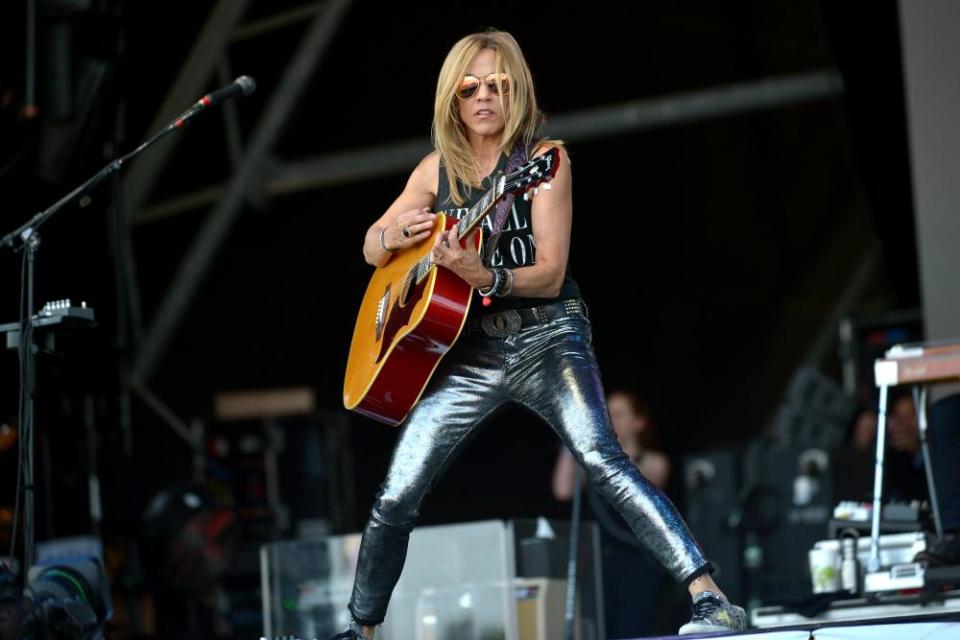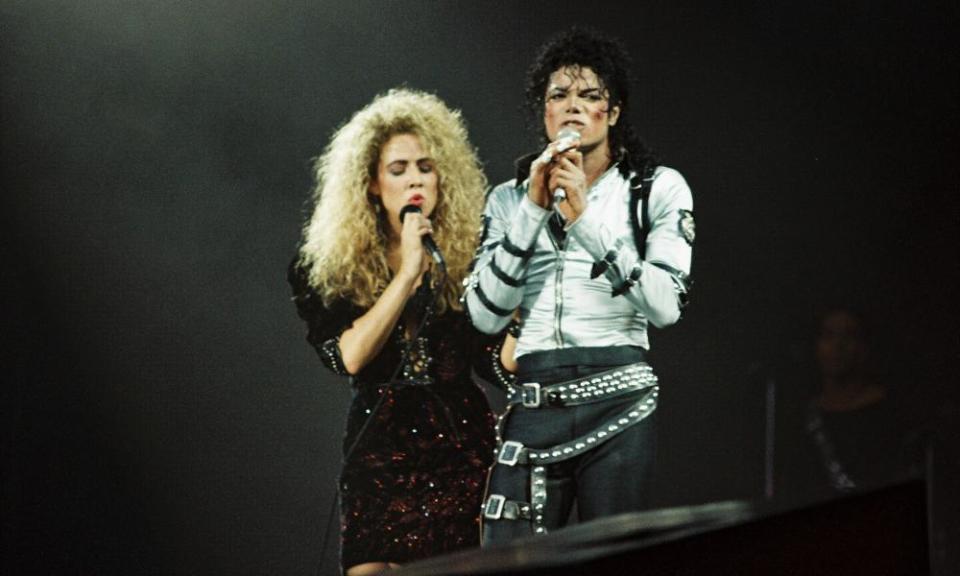Sheryl Crow’s 20 greatest songs – ranked!
20. Prove You Wrong (2019)
On Threads, her 11th and apparently final album, Crow used her bulging contacts book to create a features-heavy collection of originals and covers. Stevie Nicks and Maren Morris join her on this barrelling bar-room stomper, the three of them sounding as if they are having a ball as they put some no-mark ex on blast for their low expectations.
19. Soak Up the Sun (2002)
Bright and peppy compared with the introspective double whammy of 1996’s self-titled album and 1998’s The Globe Sessions, the lead single from follow-up C’mon, C’mon is cloyingly sweet. Crow imagines herself poor, working a “crummy job” that “don’t pay near enough” over lithe bass, before that undeniable chorus cracks the song open. It was released in early 2002, and Crow felt it could cheer up a post-9/11 society; it’s also just been covered by Gen Z indie rocker Soccer Mommy.
18. There Goes the Neighbourhood (1998)
Crow recorded the self-produced Globe Sessions album in New York’s meatpacking district, a mecca for society’s so-called undesirables in the late 90s. The “Hells Angels, transvestites and very colourful people”, as Crow put it, float in and out of this strutting, surreal character study that mentions everything from Peter Ustinov to heroin chic to Calamity Jane.

17. Cross Creek Road (2019)
Crow is an expert in varnished rock ballads that feel as if they are gently flaking at the edges. This highlight from Threads – featuring Lukas Nelson on backing vocals and Neil Young handling the second verse – starts as a simple piano ballad, complete with poetic sadness (“I took the blue sky and turned it into rain”), then slowly strays into country singalong on its swaying chorus, before gliding into a coda of splintering guitar feedback.
16. Riverwide (1998)
One of The Globe Sessions’ quieter moments, the delicate Riverwide opens with a literary allusion (“I spent a year in the mouth of a whale / With a flame and a book of signs”) before veering off on cryptic lyrical tangents that take in broken relationships and death. Crow says the song came to her fully formed, its string-drenched latter half adding a spiritual quality.

15. What I Can Do For You (1993)
Before her breakthrough success in 1993, Crow was Michael Jackson’s backing singer on his Bad tour. It was during this time that she alleges she was sexually harrassed by Jackson’s then manager, Frank DiLeo. The experience inspired two songs from debut Tuesday Night Music Club; the bluesy The Na-Na Song, and this lesser known single, in which Crow sings from the perspective of a powerful predator who tries to persuade his victim that this is all par for the course.
14. Ordinary Morning (1996)
Much of 1996’s self-titled album is suffused with a sense of trying to find happiness in scenarios you have always dreamed of. Success, it turns out, isn’t always what it’s cracked up to be, not with so many pairs of eyes on you. This suffocating paranoia permeates the album’s closing track, which combines jazz-like piano and crunching guitars to create a heady, panicked atmosphere as Crow’s sings the final lines, “Don’t you wanna slip away?”
13. Strong Enough (1993)
Tuesday Night Music Club was such a commercial behemoth in the US that even its fifth single, the folksy ballad Strong Enough, peaked in the Top 5. Showcasing a different side to Crow, she uses that careworn vocal to perfection, adding an extra layer of emotion to a lyric about searching for stability in a rocky relationship.
12. Weather Channel (2002)
In 2022’s documentary, Sheryl, Crow talks plainly about her struggles with depression. Things came to a head making C’mon, C’mon, at a time when she was desperately in need of a break, but worried that she would be forgotten. She grapples with all that on the album’s heartbreaking, Emmylou Harris-assisted closer, her cracked vocal sighing its way through lyrics including “Can you make it better for me / Can you make me see the light of day”.
11. Redemption Day (1996)
Inspired by Crow’s visit to Bosnia to visit American troops, this Dylan-esque protest song calls out the international communities’ slow response to various crises. Over a steady martial beat and ominous, twanging guitar, Crow chastises politicians (“Come leaders, come ye men of great / Let us hear you pontificate”) and the underlying reasoning behind recent wars: “On why we waited ’til so late / Was there no oil to excavate?” Despite the specificity, its anger has proved timeless, and it was covered in 2003 by Johnny Cash.
10. Anything But Down (1998)
Crow’s lyrics can be emotionally opaque . On this rollicking single from The Globe Sessions, however, she takes the direct route, listing all the things she does for a quiet life (lighting cigarettes, running baths, pouring wine) before the plain-speaking chorus shows how one-sided it all is. It features an immaculate bridge that ends with the killer kiss-off: “It was so much easier before you became you.”
9. Now That You’re Gone (2008)
Having survived breast cancer and the sudden end of her engagement to Lance Armstrong, Crow returned to what she does best on Detours, the follow-up to 2005’s sappy, commercially disappointing Wildflower. Marrying an engrained pop nous – the melodic lift into the chorus is perfect – with lyrics that celebrate a newfound independence, Rolling Stone correctly likened it to Kelly Clarkson’s Since U Been Gone, “except 20 years wiser”.
8. A Change Would Do You Good (1996)
Crow had a lot to prove on her self-titled second album. While her debut had sold more than 7m copies in the US alone, there was still an underlying suspicion that her success was down to her (male) co-writers, who themselves were publicly vocalising their displeasure at their now famous former friend. Crow playfully mocks one of them, producer Bill Bottrell, on the first verse of this melodically ebullient, fuzzed up singalong. The caustic second verse, meanwhile, was partially inspired by Madonna.
7. Run Baby Run (1993)
Released as her debut single to general indifference, Run Baby Run is now part of the Crow canon. Written in her storytelling mode, it is about a person caught between two worlds; the conservative mainstream looking back at the “better days” and the hippy-like dreamers “singing mighty protest songs”. Somehow the only thing the protagonist has learned is to run and not look back, a tactic she soon starts applying to her relationships.
6. Hard to Make a Stand (1996)
Crow’s pop nous and occasional sidestep into lightweight middle of the road can make it hard to remember how politically engaged a lot of her best songs are (and that fire remains –she called out country singer Jason Aldean last month for his threatening hit Try That in a Small Town). On 1996’s self-titled album she caused controversy for criticising Walmart’s gun policy (the retailer refused to stock the album) on Love Is a Good Thing, while this classic-sounding, Rolling Stones-esque chugger tackles anti-abortion terrorism, describing a friend who “Went to take care of her own body / And she got shot down in the road.” Moralistic, but never preachy, it is protest with a gut punch.
5. All I Wanna Do (1993)
Based around the then little known poet Wyn Cooper’s 1987 work, Fun, the gloriously carefree All I Wanna Do marked Crow’s long-awaited commercial breakthrough. Skipping breezily between rock, country (thanks to those glorious slide guitar wah-wahs) and adult-pop, All I Wanna Do was catnip to 90s US radio, eventually peaking at No 2 and cementing Crow’s status as rock’s latest superstar. Miraculously, ubiquity hasn’t dulled its pep.
4. If It Makes You Happy (1996)
Bruised by the fallout after the success of her debut, and exhausted from constant touring, Crow shed Tuesday Night Music Club’s fragility in favour of something much grittier for the self-produced follow-up’s lead single. Having acquired a characterful vocal rasp, and backed by a bruised rock swagger, Crow aims the chorus’ central question – “If it makes you happy then why the hell are you so sad?” – at herself, before firing out a warning to a world pegging her as nice and homely: “I’m not the kind of girl you’d take home.”
3. Home (1996)
The lilting Home, which finds Crow’s dextrous voice reduced to a near whisper, zooms in on a relationship that has shifted from passionate to platonic. Written around the demise of her second engagement, it explores the safety of the familiar versus the potential of the unknown, the latter encapsulated by the delicate bridge and Crow’s knowingly over-romantic desire to see the sun come up “in a stranger’s arms”. More disappointment beckons.
2. Everyday is a Winding Road (1996)
Crow quickly found that becoming incredibly famous can be destabilising, with much of her second album about the quest to find balance again. Inspired by former Crowded House drummer Paul Hester, a larger than life presence who quit while Crow was touring with the band in 1994, the song celebrates taking risks and living in the moment, all soundtracked by a heady mix of slide guitar, fuzzed up Moog bass and percussion. It had its famous fans, too: Prince covered it in 1999.
1. My Favourite Mistake (1998)
Crow was apparently close to cancelling the release of third album, The Globe Sessions, mortified at the honesty of her lyrics and their shift from veiled narratives to first person confessionals. The reaction to the album’s lead single suggests she might have been right to worry, with its allusions to a philandering ex leading to endless gossip in the press (Eric Clapton and Jakob Dylan remain in the picture). Thankfully its extraneous noise is easily drowned out by the fact that My Favourite Mistake is Crow’s greatest accomplishment, its bolshie rock riffs and showy organ tremolos instantly undermined by the resignation in Crow’s voice as she grapples with her conflicting emotions. Somehow it manages to both offer up a scintilla of hope that things might change, while also confirming its non-starter status. You sense Crow can’t quite work out how to stop the cycle.

 Yahoo News
Yahoo News 
